Greece Border Abuses Highlight Europe’s Clashing Priorities on Migration
The New York Times (archive.ph)
By Monika Pronczuk and Matina Stevis-Gridneff
2023-02-14 15:25:35GMT
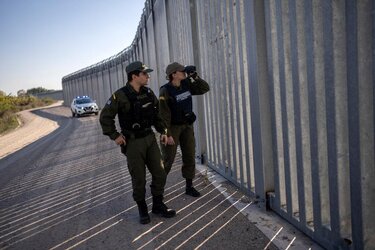
Border guards with the Greek police patrol a barrier between Greece and Turkey in October. Greece has been criticized for forcing people back into Turkey without processing their asylum requests.Credit...Petros Giannakouris/Associated Press
The human rights chief of the European Union border agency said last year that it should stop operating in Greece because of serial abuses by Greek border guards, including violently pushing asylum seekers back to Turkey and separating migrant children from their parents, according to confidential documents reviewed by The New York Times.
The E.U. agency, Frontex, deploys border guards from around Europe to help the Greek authorities with border operations, and provides equipment such as helicopters, boats and drones paid for by European taxpayers.
Instead of following the recommendation, taking legal action against Greece or investigating the findings, the E.U. set up an obscure “working group.” In a follow-up finding submitted last month, the rights chief said that there had been “no change in the reported practice.”
The reticence to act highlights a major tension in Europe’s migration policy: how to keep the number of migrants low while adhering to European laws.
The bloc’s rules protect the right of people to be given a chance to apply for asylum, and oblige E.U. nations to uphold that right.
But the arrival of more than one million refugees, mostly from Syria in 2015-2016, recast politics across Europe, pushing even traditionally progressive E.U. countries to the right and fueling the rise of identity politics.
After several years with fewer migrant arrivals in the E.U., angst over migration is now back.
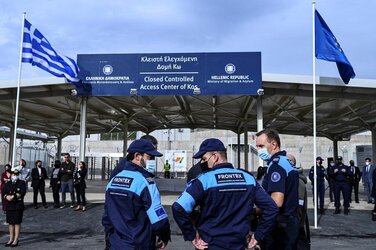
Members of the European border agency Frontex outside a migrant camp on the Greek island of Kos in 2021. Frontex deploys border guards from around Europe to help Greece with border operations.Credit...Aris Messinis/Agence France-Presse — Getty Images
Almost five million people, a record number, sought protection in the bloc last year. The vast majority, some four million, were Ukrainians who came through legal routes and were immediately granted the right to stay and work.
The remaining approximately 800,000 asylum seekers, mainly from Syria and Afghanistan, arrived in the bloc via unofficial routes, including the Greek-Turkish border.
In this political environment, the drive to keep down the number of arrivals has intensified, often trumping commitments to legal and human-rights protections, and becoming a priority over and above putting in place a shared, functioning policy.
“Among member states, there is currently no other consensus than on border control,” said Camino Mortera-Martínez, a senior research fellow at the Center for European Reform. “The debate on common asylum policy is going nowhere, so countries on external borders are left to their own devices.”
The case of Greece is emblematic of these complex dynamics.
For years, Greece, one of Europe’s biggest gateways for migrants arriving through Turkey, has been criticized by human rights organizations for forcibly sending people back to Turkey without processing their asylum requests.
But the E.U. needs Greece to keep its border tight; most migrants and asylum seekers who arrive in Greece go on to settle elsewhere in the bloc, in places like Germany, where there are more jobs and established migrant communities.
“The E.U. as an organization, and Greece as a frontline state, have a legal obligation to protect the external borders of the Schengen area,” said Ms. Mortera-Martínez, referring to Europe’s internal borderless region. “Because once someone comes in, they can freely move around.”
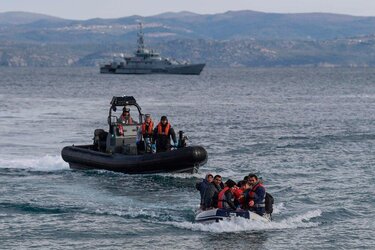
A dinghy with Afghan refugees approaches the Greek island of Lesbos in 2020, followed by a border patrol boat from Britain operating as part of Frontex.Credit...Aris Messinis/Agence France-Presse — Getty Images
The role of Frontex is to help countries like Greece guard the borders but also to create a European standard for how to do so humanely and in accordance with E.U. law. But the agency, which has grown over the past decade to become the E.U.’s best-funded, has been accused of overlooking, covering up and even carrying out human rights violations.
Last year, its executive director stepped down after accusations of harassment, mismanagement and rights abuses. New leadership vowed changes, including strengthening the role of the rights chief.
The Greek files illustrate how, even in this bolstered role, the fundamental rights officer remains marginal when political decisions are at stake, such as suspending Frontex’s work in Greece.
The human rights officer, Jonas Grimheden, issues confidential quarterly reports on conditions and abuses at E.U. borders, including countries such as Poland and Italy, as well as Greece.
In the reports for the last two quarters, which were seen by The Times, the Greek segment is the longest and most dramatic.
The officer wrote that he had gathered continued “credible reports” of the Greek authorities systematically expelling migrants at both sea and land borders, denying them access to protection, separating children from their parents and treating migrants in a “degrading” way.
The severity of these claims prompted the officer to recommend suspending the operation, after he issued three escalating “opinions,” documenting his findings in detail, over the course of 2022, the documents said.
The documentation of illegal practices in Greece by Frontex’s human rights chief is significant, experts said, because it comes from the agency itself, rather than outside sources like the news media or nongovernmental organizations.
“By staying in an operation where there are rights violations, Frontex is in breach of the rule of law,” said Luisa Marin, a legal fellow at the Florence-based European University Institute, who has been researching Frontex for over a decade. Dr. Marin said there had been a “systematic disregard” of internal rules by Frontex’s management.
The officer’s recommendations are nonbinding, Frontex said in written comments to The Times. It said that it was addressing concerns together with the Greek authorities, and that the human rights officer had reported “progress” late last month.
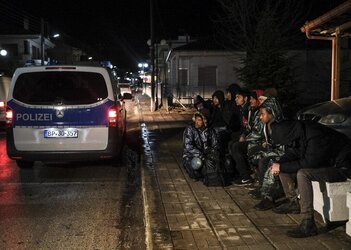
Frontex border guards in Kastanies, Greece, detain migrants from Afghanistan and Eritrea who entered from Turkey in 2020. The human rights chief at Frontex said he had gathered “credible reports” of abuse of migrants.Credit...Byron Smith/Getty Images
“As a conclusion, currently, we don’t see a reason to pull out from one of the most challenging border areas of the whole E.U.,” Frontex said in a statement.
Mr. Grimheden said in an interview that he had drafted “opinions escalating the concerns I have seen in Greece, and reported on that to the Management Board throughout 2022 but also earlier and this year.” He added that he saw “some positive procedural steps being taken by Greece, which now have to lead to concrete results on the ground.”
The European Commission said it reserved its right to launch a process, known as an infringement procedure, that could lead to taking Greece to court. Frontex has only once suspended operations over human rights abuses, in Hungary in 2021, after this procedure led to a successful court case against the country.
The Greek government said that it respected European and international law and that the allegations were being investigated. It also said that it had appointed its own human rights officer and had a broader plan, developed with the Commission, to tackle problems.
“Protecting Europe from irregular arrivals is a priority for the European Council,” the Greek government said, referring to an E.U. leaders meeting in Brussels last week.
A statement after the meeting on Friday made no mention of human rights or European asylum law, but the leaders demanded more money from the bloc’s budget to build fences to keep out would-be migrants and asylum seekers.
“I am glad we agreed on operational and concrete steps forward,” Ursula von der Leyen, the president of the Commission, told the news media after the summit. “We will act to strengthen our external borders and prevent irregular migration.”
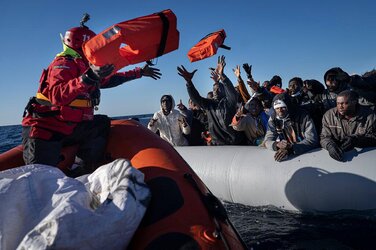
Spanish aid workers throw life jackets to migrants on an overcrowded rubber dinghy 100 miles from the Libyan coast last year. Credit...Pau De La Calle/Associated Press
The New York Times (archive.ph)
By Monika Pronczuk and Matina Stevis-Gridneff
2023-02-14 15:25:35GMT

Border guards with the Greek police patrol a barrier between Greece and Turkey in October. Greece has been criticized for forcing people back into Turkey without processing their asylum requests.Credit...Petros Giannakouris/Associated Press
The human rights chief of the European Union border agency said last year that it should stop operating in Greece because of serial abuses by Greek border guards, including violently pushing asylum seekers back to Turkey and separating migrant children from their parents, according to confidential documents reviewed by The New York Times.
The E.U. agency, Frontex, deploys border guards from around Europe to help the Greek authorities with border operations, and provides equipment such as helicopters, boats and drones paid for by European taxpayers.
Instead of following the recommendation, taking legal action against Greece or investigating the findings, the E.U. set up an obscure “working group.” In a follow-up finding submitted last month, the rights chief said that there had been “no change in the reported practice.”
The reticence to act highlights a major tension in Europe’s migration policy: how to keep the number of migrants low while adhering to European laws.
The bloc’s rules protect the right of people to be given a chance to apply for asylum, and oblige E.U. nations to uphold that right.
But the arrival of more than one million refugees, mostly from Syria in 2015-2016, recast politics across Europe, pushing even traditionally progressive E.U. countries to the right and fueling the rise of identity politics.
After several years with fewer migrant arrivals in the E.U., angst over migration is now back.

Members of the European border agency Frontex outside a migrant camp on the Greek island of Kos in 2021. Frontex deploys border guards from around Europe to help Greece with border operations.Credit...Aris Messinis/Agence France-Presse — Getty Images
Almost five million people, a record number, sought protection in the bloc last year. The vast majority, some four million, were Ukrainians who came through legal routes and were immediately granted the right to stay and work.
The remaining approximately 800,000 asylum seekers, mainly from Syria and Afghanistan, arrived in the bloc via unofficial routes, including the Greek-Turkish border.
In this political environment, the drive to keep down the number of arrivals has intensified, often trumping commitments to legal and human-rights protections, and becoming a priority over and above putting in place a shared, functioning policy.
“Among member states, there is currently no other consensus than on border control,” said Camino Mortera-Martínez, a senior research fellow at the Center for European Reform. “The debate on common asylum policy is going nowhere, so countries on external borders are left to their own devices.”
The case of Greece is emblematic of these complex dynamics.
For years, Greece, one of Europe’s biggest gateways for migrants arriving through Turkey, has been criticized by human rights organizations for forcibly sending people back to Turkey without processing their asylum requests.
But the E.U. needs Greece to keep its border tight; most migrants and asylum seekers who arrive in Greece go on to settle elsewhere in the bloc, in places like Germany, where there are more jobs and established migrant communities.
“The E.U. as an organization, and Greece as a frontline state, have a legal obligation to protect the external borders of the Schengen area,” said Ms. Mortera-Martínez, referring to Europe’s internal borderless region. “Because once someone comes in, they can freely move around.”

A dinghy with Afghan refugees approaches the Greek island of Lesbos in 2020, followed by a border patrol boat from Britain operating as part of Frontex.Credit...Aris Messinis/Agence France-Presse — Getty Images
The role of Frontex is to help countries like Greece guard the borders but also to create a European standard for how to do so humanely and in accordance with E.U. law. But the agency, which has grown over the past decade to become the E.U.’s best-funded, has been accused of overlooking, covering up and even carrying out human rights violations.
Last year, its executive director stepped down after accusations of harassment, mismanagement and rights abuses. New leadership vowed changes, including strengthening the role of the rights chief.
The Greek files illustrate how, even in this bolstered role, the fundamental rights officer remains marginal when political decisions are at stake, such as suspending Frontex’s work in Greece.
The human rights officer, Jonas Grimheden, issues confidential quarterly reports on conditions and abuses at E.U. borders, including countries such as Poland and Italy, as well as Greece.
In the reports for the last two quarters, which were seen by The Times, the Greek segment is the longest and most dramatic.
The officer wrote that he had gathered continued “credible reports” of the Greek authorities systematically expelling migrants at both sea and land borders, denying them access to protection, separating children from their parents and treating migrants in a “degrading” way.
The severity of these claims prompted the officer to recommend suspending the operation, after he issued three escalating “opinions,” documenting his findings in detail, over the course of 2022, the documents said.
The documentation of illegal practices in Greece by Frontex’s human rights chief is significant, experts said, because it comes from the agency itself, rather than outside sources like the news media or nongovernmental organizations.
“By staying in an operation where there are rights violations, Frontex is in breach of the rule of law,” said Luisa Marin, a legal fellow at the Florence-based European University Institute, who has been researching Frontex for over a decade. Dr. Marin said there had been a “systematic disregard” of internal rules by Frontex’s management.
The officer’s recommendations are nonbinding, Frontex said in written comments to The Times. It said that it was addressing concerns together with the Greek authorities, and that the human rights officer had reported “progress” late last month.

Frontex border guards in Kastanies, Greece, detain migrants from Afghanistan and Eritrea who entered from Turkey in 2020. The human rights chief at Frontex said he had gathered “credible reports” of abuse of migrants.Credit...Byron Smith/Getty Images
“As a conclusion, currently, we don’t see a reason to pull out from one of the most challenging border areas of the whole E.U.,” Frontex said in a statement.
Mr. Grimheden said in an interview that he had drafted “opinions escalating the concerns I have seen in Greece, and reported on that to the Management Board throughout 2022 but also earlier and this year.” He added that he saw “some positive procedural steps being taken by Greece, which now have to lead to concrete results on the ground.”
The European Commission said it reserved its right to launch a process, known as an infringement procedure, that could lead to taking Greece to court. Frontex has only once suspended operations over human rights abuses, in Hungary in 2021, after this procedure led to a successful court case against the country.
The Greek government said that it respected European and international law and that the allegations were being investigated. It also said that it had appointed its own human rights officer and had a broader plan, developed with the Commission, to tackle problems.
“Protecting Europe from irregular arrivals is a priority for the European Council,” the Greek government said, referring to an E.U. leaders meeting in Brussels last week.
A statement after the meeting on Friday made no mention of human rights or European asylum law, but the leaders demanded more money from the bloc’s budget to build fences to keep out would-be migrants and asylum seekers.
“I am glad we agreed on operational and concrete steps forward,” Ursula von der Leyen, the president of the Commission, told the news media after the summit. “We will act to strengthen our external borders and prevent irregular migration.”

Spanish aid workers throw life jackets to migrants on an overcrowded rubber dinghy 100 miles from the Libyan coast last year. Credit...Pau De La Calle/Associated Press